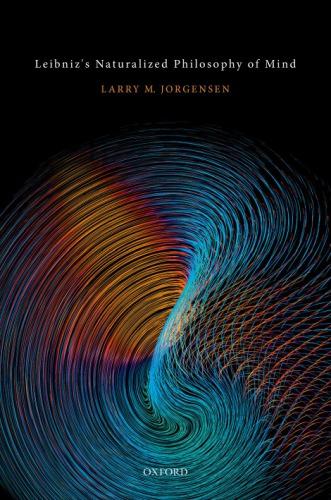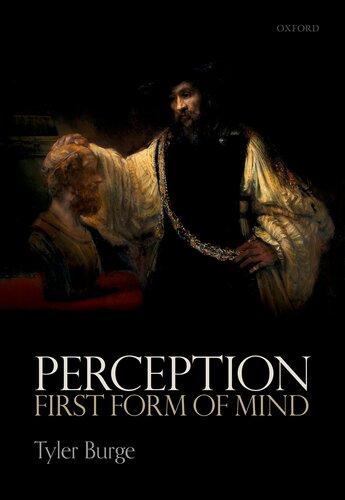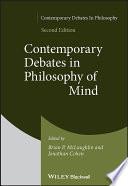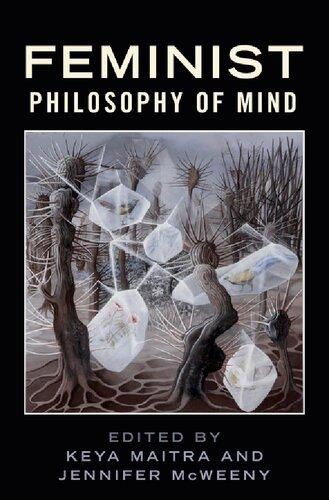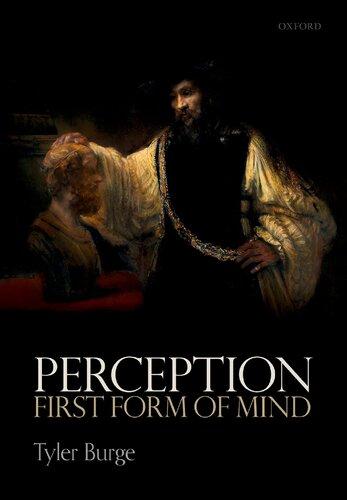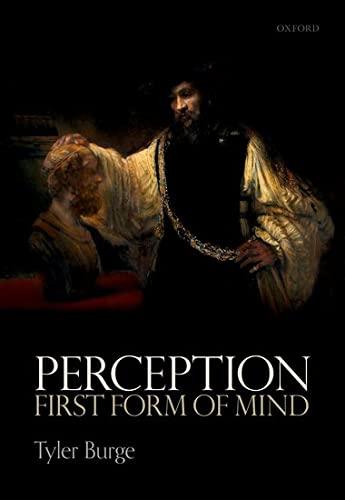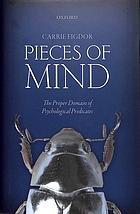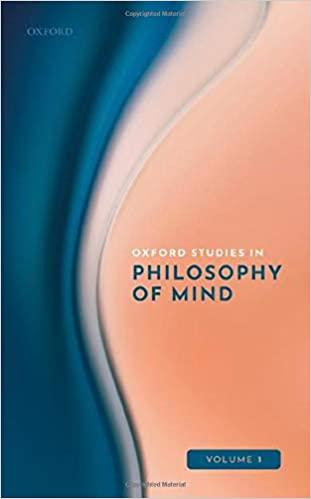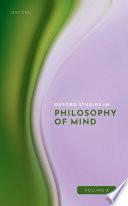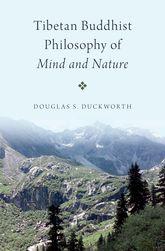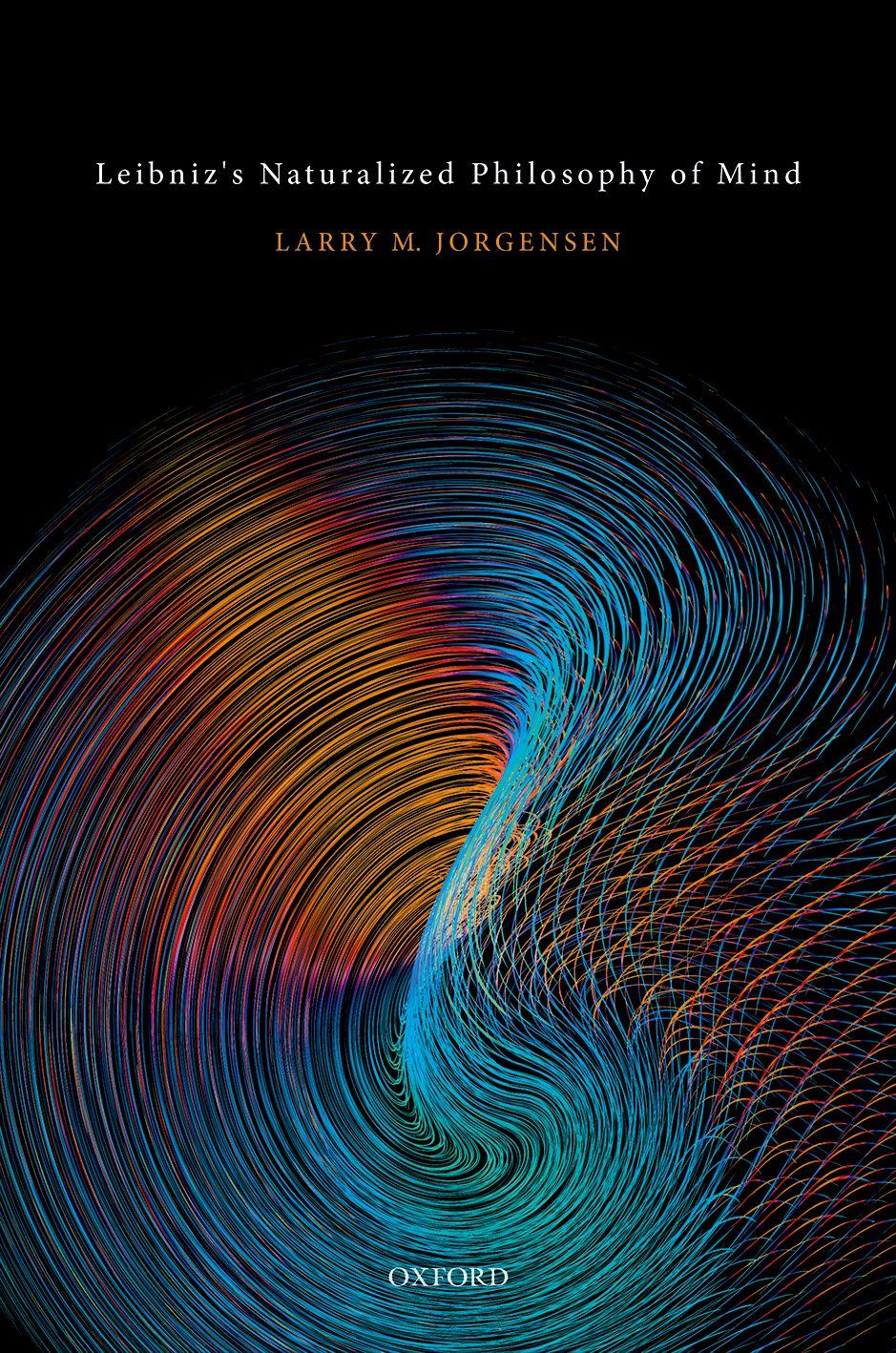Leibniz’s naturalized philosophy of mind First Edition. Edition Jorgensen
Visit to download the full and correct content document: https://ebookmass.com/product/leibnizs-naturalized-philosophy-of-mind-first-edition-e dition-jorgensen/
More products digital (pdf, epub, mobi) instant download maybe you interests ...
Perception: First Form of Mind Burge
https://ebookmass.com/product/perception-first-form-of-mindburge/
Contemporary Debates in Philosophy of Mind 2nd edition Edition Jonathan Cohen
https://ebookmass.com/product/contemporary-debates-in-philosophyof-mind-2nd-edition-edition-jonathan-cohen/
Feminist Philosophy of Mind Keya Maitra (Editor)
https://ebookmass.com/product/feminist-philosophy-of-mind-keyamaitra-editor/
Perception: First Form of Mind Tyler Burge
https://ebookmass.com/product/perception-first-form-of-mindtyler-burge/
Perception: First Form of Mind Tyler Burge
https://ebookmass.com/product/perception-first-form-of-mindtyler-burge-2/
Pieces of Mind: The Proper Domain of Psychological Predicates First Edition. Edition Carrie Figdor
https://ebookmass.com/product/pieces-of-mind-the-proper-domainof-psychological-predicates-first-edition-edition-carrie-figdor/
Oxford Studies in Philosophy of Mind, Volume 1 Uriah Kriegel
https://ebookmass.com/product/oxford-studies-in-philosophy-ofmind-volume-1-uriah-kriegel/
Oxford Studies in Philosophy of Mind Volume 3 Uriah Kriegel
https://ebookmass.com/product/oxford-studies-in-philosophy-ofmind-volume-3-uriah-kriegel/
Tibetan Buddhist Philosophy of Mind and Nature Douglas
S. Duckworth
https://ebookmass.com/product/tibetan-buddhist-philosophy-ofmind-and-nature-douglas-s-duckworth/
Leibniz’sNaturalizedPhilosophyofMind Leibniz ’sNaturalized PhilosophyofMind LarryM.Jorgensen
GreatClarendonStreet,Oxford,OX26DP, UnitedKingdom
OxfordUniversityPressisadepartmentoftheUniversityofOxford. ItfurtherstheUniversity’sobjectiveofexcellenceinresearch,scholarship, andeducationbypublishingworldwide.Oxfordisaregisteredtrademarkof OxfordUniversityPressintheUKandincertainothercountries
©LarryM.Jorgensen2019
Themoralrightsoftheauthorhavebeenasserted
FirstEditionpublishedin2019
Impression:1
Allrightsreserved.Nopartofthispublicationmaybereproduced,storedin aretrievalsystem,ortransmitted,inanyformorbyanymeans,withoutthe priorpermissioninwritingofOxfordUniversityPress,orasexpresslypermitted bylaw,bylicenceorundertermsagreedwiththeappropriatereprographics rightsorganization.Enquiriesconcerningreproductionoutsidethescopeofthe aboveshouldbesenttotheRightsDepartment,OxfordUniversityPress,atthe addressabove
Youmustnotcirculatethisworkinanyotherform andyoumustimposethissameconditiononanyacquirer
PublishedintheUnitedStatesofAmericabyOxfordUniversityPress 198MadisonAvenue,NewYork,NY10016,UnitedStatesofAmerica
BritishLibraryCataloguinginPublicationData
Dataavailable
LibraryofCongressControlNumber:2018965179
ISBN978–0–19–871458–3
Printedandboundby
CPIGroup(UK)Ltd,Croydon,CR04YY
LinkstothirdpartywebsitesareprovidedbyOxfordingoodfaithand forinformationonly.Oxforddisclaimsanyresponsibilityforthematerials containedinanythirdpartywebsitereferencedinthiswork.
ForLillianandEvan
PartI.Leibniz’sNaturalizingProject
1.NatureandNatures11
2.NaturalizingConstraints:EquipollenceandContinuity32
3.TheIntelligibilityofNature56
PartII.TheMetaphysicalBasisofMinds
4.SubstanceandForce89
5.LivingMirrors:ExpressionandPerception101
6.PerceptualDistinctnessandMentalActivity120
PartIII.MindintheNaturalOrder
7.Perception,Consciousness,andContinuity145
8.LookingBack:MemoryandConsciousness172
9.LookingForward:AppetiteandDesire201
PartIV.ThePrerogativeofMinds
10.RationalBeingsandAnimalSouls225
11.MoralIdentityandtheAppearanceoftheSelf244
12.Self-Reflection,Perception,andConceptualThought259
NatureandGrace:StrikingaLeibnizianHarmony283
Acknowledgments KarlBarth’scommentaryonthebookofRomansopenswithanacknowledgement thatthebookwaswrittenagainstthebackgroundoftheechoingofgunsand entrenchedwarfare.¹ThishistoricalmomentgaveBarth’sworkaspiritof urgency , asensethattheologiansneededtoreadcarefullyonceagainandwithfresheyesone ofthefoundationalworksoftheirdiscipline.Ashesaidintheprefacetothe first edition, “Theunderstandingofhistoryisanuninterruptedconversationbetweenthe wisdomofyesterdayandthewisdomoftomorrow.”²Iwouldhavelikedtoproducea similarsortofbook.Thesoundsofwarhavebeenricochetinginthebackgroundof thisbookaswell startingwhenmysecondyearofgraduatestudieswasinterrupted bythe9/11attacksandendingnowwithtwoconsecutivesummersintheUnited Stateswhereasanctuarywasviolatedbymassmurder(theEmmanuelAMEChurch inCharleston,SouthCarolina,onJune17,2015,andthePulsenightclubinOrlando, Florida,almostexactlyoneyearlateronJune12,2016),andinmediatingyears between2001andtoday,therehasbeencontinuousconflictaroundtheworldand, morerecently,amajorrefugeecrisis.
ThisbookisanacademicbookonLeibniz’sphilosophyofmind,notdirectly connectedwiththetragicsceneIhavejustmentioned.Andyet,Idothinkthatwe oftenneedtolookbackbeforewearepreparedtomoveforward.Leibnizwaswriting inthemidstofareligiouslyandpoliticallyfracturedEurope.Andhisphilosophyof mindisapieceofamuchlargervisionofthe life ofamindorientedtowardsjustice. WhileLeibniz’soptimismhasmetwithcaricatureandderision,hesoughttogiveita deepmetaphysicalgrounding,someofwhichwillcomeoutinthecourseofthisbook. Leibniz’sdoublevision ofaregularandintelligiblenaturalorder,whichwouldallow forscientificandtechnologicalprogress,andofavalue-richnaturalorder,which wouldallowforactionsmotivatedbyjusticeandlove here and now groundedahope forreconciliationandpeaceinEurope.AndwhileIhavenofantasiesthatanacademic bookinthehistoryofphilosophywilldothesameforourfracturedworld,itis animatedbyasimilarvisionforseriousworkmotivatedbythegenuineinterest, thoughtfulness,andrespectthatisapre-requisiteforanyrealchange.
Inthis,Ihavebeendeeplyshapedbymyrelationshipswithcolleaguesand advisors.MichaelDellaRocca,RobertMerrihewAdams,andAlisonSimmonsmade opportunitiesforlongconversationsthatdeepenedmythinkingonLeibnizininnumerableways.SamuelNewlands,MarkKulstad,MarthaBolton,JuliaJorati,Jeffrey MacDonough,AndrewChignell,DonaldRutherford,DanielGarber,ChristianBarth, GregoryBrown,PaulLodge,MariaRosaAntognazza,MarleenRozemond,andMarkku Roinilahaveallenrichedmywork.PeterMomtchiloffatOxfordUniversityPress deservesparticularthanksforhishelpingettingthisprojecttocompletion.
¹KarlBarth, TheEpistletotheRomans,trans.EdwynC.Hoskyns(London:OxfordUniversityPress, 1933),v.The firsteditionwasprintedin1918.
²Ibid.,1.
Iemphasizetomystudentstheneedforastrong communityofphilosophers,andthisis mycommunity.
Butmycommunityextendsmuchwiderthanthis.Ipresentedportionsofthiswork attheXLeibnizCongressinHannover,Germany;theSecondArcticCircleSeminarin EarlyModernPhilosophyinFinland;the “ForceForschung:ModernPhilosophical ConceptionsofForce” atCornellUniversity;theSecond and SixthBiennialMargaret DaulerWilsonConferencesatUCSDandDartmouth;theScottishSeminarin EarlyModernPhilosophyinAberdeen,Scotland; “EarlyModernConceptionsof Consciousness” atHumboldtUniversity,Berlin;theMidwestSeminarinEarlyModernPhilosophyatMarquetteUniversity;theFirstAnnualLeibnizSocietyConference atRiceUniversity;theHoustonEarlyModernGroup;andtheCentralCanadaSeminar fortheStudyofEarlyModernPhilosophyattheUniversityofGuelph.Iamgratefulfor themanyconversationsIhadwithparticipantsateachoftheseconferences.
IwouldliketoacknowledgetheDepartmentofPhilosophyandtheadministration ofSkidmoreCollegeandanNEHSummerGrantforsupportofthisproject.The writinggroupsatSkidmoreCollegewereaninvaluablesourceofencouragement. ColleaguesandstudentsatSkidmoreCollegeandValparaisoUniversityandfriends inSaratogaSpringshavebeenendlesslysupportiveofmywork,andI finditareal boontoworkandliveamongsttheseamazingandwonderfulpeople.
Atamorefundamentallevel,thisbooktookshapearoundarichandcomplicated lifewithmyfamily.ForLillian,thisbookhastakenshapearoundcooperativefulltimechildcare,abrieflifeinLondon,andconcertsrangingfromchamberensembles toImagineDragons.Fromthebeginningofthisproject naminganeighborhoodcat “LightMiss” (afterLeibniz) untiltoday,LilyhasbecomeafellowtraveleroutofThe Cave,fullofinsightandapassionforjustice.ForEvan,thisbooktookshapearound trampolinesandADK firetowers.HeistheonlykidIknowwhoisenticedinto drinkinghismilkbyZeno’sparadox.Throughhisunendingcuriosityandquestioning,EvanhasshownthepolymathdrivethatLeibnizhimselfhad:science,philosophy,math,history,theology,andliteratureallhaveaspaceinEvan ’shead(andoften inunexpectedways!).And, finally,Caitlin’sencouragementandgraceinfusethis bookwithmeaning.Shehasbeenmyfullpartnerinexploringwithwonderthelifeof themind,andwearetogetherbuildingsomethingthatwemerelyglimpsedtwenty yearsago.Sheisourlocalsuperhero(seriously!),andshepersists.
Portionsofthisbookhavebeenpublishedpreviously,althoughmostoftheworkhas beenrevisedandreworkedforthisvolume.Apartofchapter2overlapswith “By LeapsandBounds:LeibnizonTranscreation,Motion,andtheGenerationofMinds, ” TheLeibnizReview 23(2013):73–98.Chapters3and7makeuseofmaterialfrom “ThePrincipleofContinuityandLeibniz’sTheoryofConsciousness,” Journalofthe HistoryofPhilosophy 47(2009):223–48.Chapters5and6makeuseofmaterialfrom “LeibnizonPerceptualDistinctness,Activity,andSensation,” JournaloftheHistory ofPhilosophy 53(2015):49–77.Chapters8and9revisitmaterialfrom “Leibnizon MemoryandConsciousness, ” BritishJournalfortheHistoryofPhilosophy 19(2011): 887–916and “MindtheGap:ReflectionandConsciousnessinLeibniz, ” Studia Leibnitiana 43(2011):179–95.Theconclusiondrawsinpartfrom “Consciousness inWesternPhilosophy” in TheRoutledgeHandbookofConsciousness,ed.Rocco Gennaro(NewYork:Routledge,2018),24–37.
ListofAbbreviations AbbreviationsforEditionsofLeibniz’sWorks:
A SämtlicheSchriftenundBriefe (DarmstadtandBerlin:BerlinAcademy, 1923–).
AG PhilosophicalEssays ,trans.RogerAriewandDanielGarber(Indianapolis,IN:Hackett,1989).
Arthur TheLabyrinthoftheContinuum:WritingsontheContinuumProblem, 1672–1686,trans.RichardT.W.Arthur(NewHaven,CT:YaleUniversity Press,2001).
C OpusculesetFragmentsInéditsdeLeibniz ,ed.LouisCouturat (Hildesheim:GeorgOlms,1966).
Child TheEarlyMathematicalManuscriptsofLeibniz;translatedfromthe LatintextspublishedbyCarlImmanuelGerhardtwithcriticaland historicalnotes,trans.J.M.Child(Chicago;London:TheOpenCourt PublishingCompany,1920).
CP ConfessioPhilosophi:PapersConcerningtheProblemofEvil, 1671–1678,ed.andtrans.RobertC.Sleigh,Jr.(NewHaven,CT:Yale UniversityPress,2005).
DM DiscourseonMetaphysics,A6.4.1529–88/L303–30.
DSR DeSummaRerum:MetaphysicalPapers,1675–1676,trans. G.H.R.Parkinson(NewHaven,CT:YaleUniversityPress,1992).
Dutens OperaOmnia,ed.L.Dutens,6vols.(Geneva:FratresdeTournes,1768).
G DiePhilosophischenSchriften ,ed.C.I.Gerhardt,7vols.(Leipzig: Lorentz,1879).
GM LeibnizensMathematischeSchriften ,ed.C.I.Gerhardt,7vols.(Berlin: A.Asher,1849–63).
Grua TextesInédits,ed.byGastonGrua(Paris:PressesUniversitairesde France,1948).
L PhilosophicalPapersandLetters,trans.LeroyE.Loemker,2nded. (Dordrecht:D.Reidel,1970).
LA TheLeibniz–ArnauldCorrespondence,trans.H.T.Mason(Manchester: ManchesterUniversityPress,1967).
LC TheLeibniz–ClarkeCorrespondence ,ed.H.G.Alexander(Manchester: ManchesterUniversityPress,1956),citedbyauthor,letternumber, andsectionnumber.Thecorrespondencecanalsobefoundin G7.352–420.
Langley NewEssaysConcerningHumanUnderstanding,trans.A.G.Langley, 2nded.(NewYork:Macmillan,1896).
Lodge TheLeibniz–DeVolderCorrespondence,trans.PaulLodge(New Haven,CT:YaleUniversityPress,2013).
LR TheLeibniz–DesBossesCorrespondence,trans.BrandonC.Lookand DonaldRutherford(NewHaven,CT:YaleUniversityPress,2007).
M Monadology,G6.607–23/L643–53.
MP Leibniz:PhilosophicalWritings,trans.MaryMorrisand G.H.R.Parkinson(London:Dent,1973).
NE NewEssaysonHumanUnderstanding,trans.PeterRemnantand JonathanFrancisBennett(Cambridge:CambridgeUniversityPress, 1996).
NS Leibniz’ s ‘NewSystem’ andAssociatedContemporaryTexts,trans. RogerS.WoolhouseandRichardFrancks(NewYork:Oxford UniversityPress,1997).
PG “Extraitd’uneLettredeM.L.surunPrincipeGénéral,Utileàl’ExplicationdesLoixdelaNature,parloaConsiderationdelaSagesse Divine;pourServirdeRépliqueàlaRéponseduR.P.M.,”Nouvellesde laRepubliquedesLettres (1687);alsoincludedinG3.51–5/L351–4.
PNG PrinciplesofNatureandGrace,G6.598–606/L636–42.
Riley PoliticalWritings,trans.anded.byPatrickRiley(Cambridge: CambridgeUniversityPress,1988).
RML MalebrancheetLeibniz:RelationsPersonelles,ed.AndréRobinet (Paris:J.Vrin,1955).
Shorter TheShorterLeibnizTexts,trans.LloydStrickland(London: Continuum,2006).
T Theodicy,trans.E.M.Huggard(LaSalle,IL:OpenCourt,1985).
Wiener Leibniz:Selections ,trans.PhilipP.Wiener(NewYork:Charles Scribner’sSons,1951).
WF PhilosophicalTexts,ed.andtrans.byR.S.WoolhouseandRichard Francks(Oxford:OxfordUniversityPress,1998).
AbbreviationsfortheWorksofOtherSeventeenth-CenturyFigures :
ATRenéDescartes, OeuvresdeDescartes,ed.C.AdamandP.Tannery, 11vols.(Paris:J.Vrin,1973).
CSMRenéDescartes, ThePhilosophicalWritingsofDescartes,trans.John Cottingham,etal.,3vols.(Cambridge:CambridgeUniversityPress, 1984).
SearchNicolasMalebranche, TheSearchafterTruth,trans.Thomas M.LennonandPaulJ.Olscamp(Cambridge:CambridgeUniversity Press,1997).
Introduction ThemodernshavecuttheGordianknotwithAlexander’ssword,andhave introducedmiraclesintoanaturalthing,likegodsinthetheatreatthedenouementofanopera.¹
Myaimwastoexplainnaturallywhattheyexplainbyperpetualmiracles.²
ThecelebratedAmericanauthorWillaCather(1873–1947)writesinalettertoa closefriend:
Ithasbeenverydrydownhere,andeveryonehasbeentalkingaboutrain.MammatoldElsie thatGodmadetherain.YesterdayMr.McNitthadhistwolawnsprinklersgoingforthe first timethisyear.Elsiecamerunninginscreaming, “OWillie!comequickandsee,thereare two littleGodsoutinMcNitt’syardjustrainingawaylikeeverything.”³
ElsiemadeamistakethatGottfriedWilhelmLeibniz(1646–1716)thinksiseasyto make.In DM §8,Leibnizsaysthat “itisratherdiffi culttodistinguishtheactionsof Godfromthoseofcreatures;forsomebelievethatGoddoeseverything,while othersimaginethathemerelyconservestheforcehehasgiventocreatures. ”⁴ And yet,thereissomethingquiterightaboutElsie’sclaim,since,asLeibnizgoesonto say,thenatureofmindsis “sonoblethatitbringsthemasneartodivinityasitis possibleforsimplecreatures”⁵ and,elsewhere,that “eachmind[is]likealittledivinity initsownrealm.”⁶
ThekeytounderstandingLeibniz’sposition,andthemistakeofElsie,istoseethat theexpressionofthedivineisfullygroundedinthenaturalpropertiesofthemind. Leibniz’stheologygenerates naturalizingconstraints thatleadhimtoafullynatural theoryofmind,whereindividualsaregenuineagentsintheirownright.Leibniz soughttoshowthattheactionsofcreatures can bedistinguishedfromthoseofGod, carvingoutamiddlegroundbetweenSpinoza,forwhomallcreaturesaremerely finitemodesofGod,andMalebranche,forwhomGodoperatesasthesolegenuine cause.Leibnizarguesinsteadthatthereareindividual,causallyefficacioussubstances,
¹G3.346/NS223.²G6.595/NS250.
³LetterfromWillaCathertoMarielGere,June1,1893(WillaCather, TheSelectedLettersofWilla Cather (NewYork:AlfredA.Knopf,2013),18)
⁴ DM§8. ⁵ DM§36.
⁶ M§83.FormorereferencestopassagesinwhichLeibnizdescribesmindsaslittlegods,seeGregory Brown, “Leibniz’sMoralPhilosophy,” in TheCambridgeCompaniontoLeibniz,ed.NicholasJolley (Cambridge:CambridgeUniversityPress,1995),427.
evenasthesemindsprovidean image ofthedivine.Asstatedintheepigraph,what theotherssoughttoexplainbymeansofanappealtothedivine,Leibnizsoughtto explaininanaturalway.
Themainargumentofthisbookiseasytostate: Leibnizoffersafullynaturaltheory ofmind.Intoday’sphilosophicalclimate,inwhichmuchefforthasbeenputinto discoveringanaturalizedtheoryofmind,Leibniz’seffortstoreachasimilargoal 300yearsearlierwillprovideacriticalstancefromwhichwecanassessourown theories.Butwhilethe goals mightbesimilar,the content ofLeibniz’stheory significantlydivergesfromthemajorityoftoday’stheories.Manyphilosophers todayareworkingtowardsanaccountofmindinfullyphysicalterms.Incontrast, themostfundamentalelementsofLeibniz’smaturetheoryofmindareindivisible, unextendedsubstances,whichheterms monads toidentifythemasthetrueunitiesof nature.Despitethisstarkdifferenceinthebasicelementsofthesystem,orperhaps because ofit,Leibnizprovidesuswithavaluablealternativeandapossibleway forwardamidstotherwiseintractabledebates.Indeed,itishelpfulinatleastthis sense:itallowsustodistinguishabroadnaturalizingprojectfromthemorenarrowly conceivedphysicalistproject.
Ofcourse,Irecognizethattheterm “naturalism” isdeeplydisputed.Leibniz himselfusedtheterm “naturalism” inanegativesense,although,atthesametime, hedescribedhistheoryas “morenatural” thanthecompetitors.Giventhat,Ithink thereissomethingimportantcapturedinviewingLeibniz ’stheoryasa naturalized theoryofmind.Althoughtheterm “naturalism” isaslipperyoneeventoday,itis widelyregardedasadesirablegoal.Butitremainsunclearjustwhatthegoalis.
Onewaytostatethegoalofcontemporarytheoristsisthis:a naturalized theory willbeonethathasnoirresolvable “mysteries”—mysterieslikethosepresentedby phenomenalconsciousness(i.e.,the qualitative aspectofourexperience),which DavidChalmershasfamouslycalleda “hardproblem” becauseitisfundamentally mysteriousanditisunclearhowtoresolvethemystery. ⁷ ThomasNagelthinksthe mysterieswillremainuntilwehaveretooledourconceptualframework.⁸ Butnaturalistsofmanystripesoffertheoriesthatpurporttoexplainconsciousness,removing themysteries.AsFredDretskehasputit,anaturalizedtheorymaynot “ remove all themysteries[but]itremovesenoughofthem ...to justifyputtingone’ smoney onthenoseofthisphilosophicalhorse.”⁹
So,onewaytorecognizeanaturalizedtheoryisthatitprovidesplausibleor satisfactory explanations ofallmentalstatesandeventsinawaythatisintelligible tohumanbeings.Naturalismisaboutdischargingexplanatorydemands.Inthis, Leibnizwasextraordinarilyprescient,defendinganaccountofthemindthatprovidesfullynaturalexplanationsformentalstatesandeventsandprovidingan explanatoryframeworkthatremovesanyresidualmysteries,oratleast “enoughof them,” toechoDretske.
⁷ DavidJ.Chalmers, “ConsciousnessanditsPlaceinNature,” in PhilosophyofMind:Classicaland ContemporaryReadings,ed.DavidJ.Chalmers(Oxford:OxfordUniversityPress,2002).
⁸ ThomasNagel, “ConceivingtheImpossibleandtheMind–BodyProblem,” Philosophy 73(1998).
⁹ FredDretske, NaturalizingtheMind (Cambridge,MA:MITPress,1997),xiii.
Thereisalsoawayinwhichthe historical contextofLeibniz’stheoryreflectsour ownsituation.Intheseventeenthcentury,theScientificRevolutionwaswellunderway,andnumerouspreviouslyarcaneaspectsofnaturewerebeingexplainedin increasinglymechanicalterms.Butatthesametimetherewerepersistentquestions abouthowfarthesemechanicalexplanationscouldextend.Some,likeDescartes, limitedmechanicalexplanationstobodies mindswereexcludedfromthat sort of explanation.Others,likeHobbes,werefullypreparedtoincorporatemindsintothe materialmachine,causingsomeanxietyamongphilosophersandtheologiansthat importantmoralandtheologicalcategorieswouldbeeliminated.Leibniz’sresponseto thissituationwastocarveoutamiddleground:mindsarefullyapartofthenatural system,buttheyarenotmerelymaterialmachines.Hisnaturalismisonethat,he plausiblythought,is consistent withcentralmoralandtheologicalpositions.Whilethis mightbeseenasanimportant historical consequence,italsoprovidesaframeworkfor evaluatingforourselveshownaturalizedtheoriesmightcoherewithmoralandreligiousphilosophicalviews.Thisisanissuethathascapturedpopularattentioneven today Leibnizstoodatthenexusofmanyoftheimportantdebatesthenandnow. Additionally,liberalsocietieshavelongbeencommittedtothenaturalsciences and toreligiouspluralism.Itisasourceofmuchgriefthatthesetwopositionsare nowregarded,bypeopleonbothsides,asincompatible.Theincompatibilityis havingbadeffectsonourabilitytolivetogetherincommunity,totalkcivilly,and tomakeprogressinbothscienceandtheology.AndsoaLeibnizianharmony betweennatureandthedomainoffaithisnotmerelytheoretical.
ThisbookisanefforttoseehowtheLeibnizianharmonyholdsupfromthe perspectiveofhisphilosophyofmind.Granted,manyofthedetailsofLeibniz’ s philosophyofmindwouldneedtobeupdatedinordertomakeitaplausible candidatetheoryofmindin today’ s discussions,ataskIdon’tintendtodointhis volume,buttheoverallmetaphysicisonethatmightcastsomelightonourown thinking.Indeed,asIhaveworkedthroughLeibniz ’ssystem,Ihaveseensomeways inwhichImightdepartfromwhathehaspresented(notallofwhicharenotedinthis volume),butthisbenefitofvisioncomesonlythroughthehardworkofseeingthings through his eyesforabit.
Ofcourse,byidentifyingabroadermotivationforthisprojectintheintroduction, Iopenmyselftovariouscharges:oftakingLeibniz’smetaphysicsoutofitshistorical context,ofanachronism,orofpressingLeibnizintomyownmold.But,forme,this intersectionofcurrents thosethatmotivateLeibniz’sthinkingandthosethat motivateourownthinking animatestheprojectallthemore.AndIsuspectthat Leibnizwouldhavewelcomedtheproject.RememberthatLeibnizisknownfor continuouslyrevisitingkeyconclusions,tryingoutnewavenuesofthoughtand revisinghisthinkinginlightoftheevidence.AnditisclearthatLeibnizneverdid finishhisproject.Andso,evenastatementofLeibniz’sviewswillbeofa dynamic position,onethatwasstillrespondingtotheworriesofhistimeandthechallengesof hisownthinking.ThisdynamicsofthoughtmakesLeibnizdifficulttointerpret,butit alsogivesusapictureofahighlyintelligentpersonwrestlingwithdifficultissues,and itinvitesustodothesame.
Narrowinginfromthisbroadersetofissues,themorespecificargumentofthis bookisthatLeibniz’sphilosophyofmindmeetsthestandardsofwhat he would
regardasafullynaturaltheory.Leibniz ’scommitmenttonaturalismisclear.Inthe NewEssays ,Leibnizsaysthat:
Wheneverwe findsomequalityinasubject,weoughttobelievethatifweunderstoodthe natureofboththesubjectandthequalitywewouldconceivehowthequalitycouldarisefromit. Sowithintheorderofnature(miraclesapart)itisnotatGod’sarbitrarydiscretiontoattachthis orthatqualityhaphazardlytosubstances.Hewillnevergivethemanywhicharenotnaturalto them,thatis,whichcannotarisefromtheirnatureasexplicablemodifications.¹⁰
Thisisabroadclaimaboutmethodologyinnaturalphilosophy.Aswewillsee,andas isevidenthere,Leibniz’stheologicalcommitmentsyieldathoroughgoingnaturalizingmethodology:thepropertiesofanobjectareexplicableintermoftheobject’ s nature.Ifwecannotconceivehowthiscouldbeinanygivencase,thenwehavenot yetarrivedatthenaturalexplanation.Ofcourse,Leibnizquali fiesthisclaim,allowing forthepossibilityofmiracles,butasIwillarguewhileLeibnizclearlyleavesopenthis possibility,onmyviewthepossibilityisonlyveryrarelyrealized.AndsoLeibniz concludesthispassage:
Thisdistinctionbetweenwhatisnaturalandexplicableandwhatismiraculousandinexplicableremovesallthedifficulties.Torejectitwouldbetoupholdsomethingworsethanoccult qualities,andtherebytorenouncephilosophyandreason,givingrefugetoignoranceand lazinessbymeansofanirrationalsystem.¹¹
Thesearestrongwords,whichrevealthedepthtowhichLeibniz’snaturalizing commitmentsreach.AndIwillarguethathepursuedhisphilosophyofmindwith thismethodologyinhand.
Ifwekeepthiscommitmenttoanaturalizingprojectinmind,thenwewill findin Leibnizarichandinterestingphilosophyofmind.Butthereareotheraspectsof Leibniz’stheoryofmindthatwewillneedtoemphasizeaswell.Leibnizwasnotalone inarguingforwhatwetodaymightcallanaturalizedtheoryofmind.Plausibly, Hobbes,Spinoza,andHumecouldbeseenasengagedinthissortofaprojectaswell. So,itisnotmerelythatLeibniz’stheoryofmindisa natural theorythatdistinguishes histheoryfromtheothers.TherearetwootherimportantaspectsofLeibniz’stheory ofmindthatwillbeemphasizedinthisvolume.First,Leibniz ’stheoryofmind preservesapluralityofgenuinelyindividualsubstancesthatarethemselvescausally active.Thatis,the activity ofindividualsubstancesprovidesthebasiccomponentof Leibniz’stheory.Second,Leibniz’stheoryofmindisafully representational theory ofmind.Eachstateofamentalsubstanceprovidesinformationontheworldaround it,fromitsownpointofview.
ThemostbasicelementsofLeibniz’smaturephilosophyaresimplesubstances, which,bytheirverynature,arerepresentationalandactive.Thus,wehaveanearly expressionofadynamicandrepresentationalistphilosophyofmind.But,asIhave said,eventhoughhisisanaturalizedphilosophyofmind,heis not amaterialist.The basicelementsofnaturehavethesesameproperties theyaremind-likesubstances that,attheiressence,arerepresentationalandactive.AndsoLeibniz’sphilosophyof
mindactuallylaysclaimtoexplainingmorethanmerelyhigher-ordermental phenomena.Itaimstoexplainmuchthatgoesbyinmindsentirelyunnoticed,and whichexplainshowitcouldbethatthebasicelementsofnaturearenon-extended. Noone(tomyknowledge)hasbroughtforwardthesethreecommitments the commitmenttoa natural theoryandthecommitmentstosubstancesasessentially active andas representational inanadequateway.Thesewillbethethreepillars uponwhichthetheoryrests.
TheArgumentoftheBook Ofcourse,wemustbecautiousaboutapplyingourowntrendypositionstohistorical figures,andthenaturalizingclaimsthatIdefendinthisbookmightthreatentodo justthat.AsIhavementioned,Leibniz’sownuseoftheterm naturalism islargely negative.WhenLeibnizusestheterm “naturalist” (asopposedto “nature” or “natural”),itispejorative,typicallyidentifyingwhatwetodaymightcall materialists or fatalists.¹²Hedoesnotexplicitlyusetheterm “naturalist” or “naturalized” in referencetohisowntheory.
Leibniz ’sfailuretoapplythetermtohisowntheoryshouldnotbeconsidered evidencethatthetermdoesnotapply.Althoughhedoesnotexplicitlycallhistheory anaturalizedtheory,hedoescallita natural theory.Theuseoftermslike “naturalized” or “naturalism” todayisdifferentthanitwasintheseventeenthcentury.In theseventeenthcentury,theterm “natural” wasamoreappropriateonetouseasa descriptorofone’stheory,withoutan “-ism” suffix.So,onecouldtalkabouta “naturalscience,” a “naturaltheology,” anda “naturaltheoryofmind.”
Whatdoesthesuf fixdo,afterall?Typically,whendiscussinga “naturalized” epistemologytoday,forexample,thesuf fixsuggeststhatsomethinghasbeenrooted outanddiscarded.Theepistemologyhasbeensufficientlybroughtdowntothelevel ofscienceandnoneofthespeculativeresidueisleft.Giventhis,itmightbe appropriatetodescribeLeibniz’sprojectasa “naturalizing” project.Descartes’sand Malebranche’stheoriesofmindstillhavetoomuchresidue theyhavenotbeen broughtdowntoearth,asitwere.Leibniz’stheory,byhisownaccount,ismore “natural.”¹³So,IthinkwecanconsiderLeibniz’stheoryanaturalized accountwhen consideredinreferencetoCartesiantheories.
Eventoday,theterm “naturalized” isopaque,oftenmakingsenseonlyonceyou knowwhatsortoftheoryisbeingpickedoutasnotnaturalenough.Thiseasilyleads toagameofphilosophicalleap-frog,inwhicheachtheorytriestobetterthelast.Iam hopingthatwecanturnthisgamearoundabitandlookbackatsomepriormoves, consideringonepositionvisitedalongtheway.Thishistoricaldistancecangiveusa kindof critical distanceonourownviews.But,forobviousreasons,wecannot assumethateverythingthatLeibnizsaidaboutthemindtranslateswithoutremainderintothetermsoftoday’sdebates.Inordertogettherightsortofcriticaldistance, weneedtoappreciatejusthowfarthedistanceis.Andthatwillrequirethatwe
¹²SeeAG281.¹³ToArnauld,October9,1687(G2.113/LA145).
considercarefullyhowtheuseofterms,thehistoricalcontext,andthesystematic connectionswithinthetheoryitselfmightbedistinctiveintheseventeenthcentury.
Withthatinmind,thisbookwillstartbyconsideringwhat, forLeibniz,itmeans foratheorytobeanaturaltheory.Howdoesheusetheterm “nature” andwhatdoes thedivisionbetween natural and non-natural amountto?WhatareLeibniz ’scriteria foranaturaltheory,andwhyisitthattheCartesiantheoriesdonotpassthetest? OncewegraspLeibniz ’sownaccountofanaturaltheory,PartIofthisbook,only thencanweconsiderhow(orwhether)hisowntheoryofmindisitselffullynatural. Thisbookisinfourparts.The firsttwopartsprovidethesystematicandhistorical contextforthephilosophyofmindthatisdevelopedinthesecondhalfofthebook. ReaderswhoareprimarilyinterestedinLeibniz’sphilosophyofmindmaydiscover thatthesecondhalfofthebookcouldstandlargelyonitsown.However,thefull defenseforthesystematicconstraintsIapplyindefenseoftheinterpretation developedinthesecondhalfofthebookispresentedinthe firsthalfofthebook, andsothefullpictureemergesonlywiththisbackgroundinplace.
Thestructureofthebookwillfollowthisstoryline.InPartI,Iwilloutline Leibniz’snaturalism.Chapter1investigatesLeibniz’sconceptof “nature,” which focusesonthedemandforexplanation.Chapters2and3outlinetwoprinciples thatLeibnizbelieveswillaidinourdiscoveryofnaturalexplanations:(1)the principleofcontinuity,and(2)theprincipleofthebest.Bothoftheseprinciples, accordingtoLeibniz,derivefromthenatureof God’ s activity.Since,accordingto Leibniz,Goddoesnothingwithoutareason,thisgivesusconfidencethatthere is a reasonorexplanationavailableforanygivenphenomenon.Butbeyondamere promiseofexplanation,theprincipleofcontinuityandtheprincipleofthebest provetobeusefulheuristicsin discovering naturalexplanations.PartIshowsthat Leibnizhasaclearconceptionoftherequirementsofafullynaturaltheoryandthat suchatheorydoesnotimmediatelyunderminethesharpspeciesdistinctionsthathe arguesforinhistheoryofmind.
PartIIpresentsthebasicstructuresofLeibniz’stheoryofmind thethingsthat mindsandsimplersubstanceshaveincommon.Inthissection,Ipresentanew interpretationofLeibniz’stheoriesof perception and mentalrepresentation,which providethemostbasicbuildingblocksforhistheoryofmind.Whileverygoodwork hasbeendoneonLeibniz’stheoryofrepresentation,IargueinPartIIthatinterpretershavenotgivensufficientattentiontotwoothercentralconceptsforLeibniz’ s theoryofperception:(a) activity and(b) mediation.Chapters5and6develop Leibniz’stheoryofsubstance,withattentiontoactivityandrepresentationrespectively.Chapter7supplementsLeibniz ’saccountsofrepresentationandactivitywith anaccountofthemediationofperceptionsviathebody.Anaccountofperceptual distinctnessrequiresallthree.Thebenefitofthisnewinterpretationwillbetodispel someoftheoddities(orpossibleinconsistencies)inLeibniz’suseoftheconceptof perceptualdistinctness.AttheendofPartII,themainunderlyingstructuresofthe Leibnizianmindwillbeinplace.
InPartIII,IpresentanaccountofLeibniz’stheoryofwhatonemightcallan animalmind,theaspectsofperception,sensation,consciousness,appetite,anddesire thathumansshareincommonwithotheranimals.HereIinvestigatehistheoriesof consciousness,memory,andappetite,focusingonhowLeibnizexplainseachofthese
infullynaturalterms.Inchapter7,Iargueforasame-ordertheoryofconsciousness groundedinperceptualdistinctnessagainstotherprominentinterpretationsof Leibniz’stheoryofconsciousness.Inchapter8,IunpackLeibniz’srichandcomplex accountofmemory,whichhasimportantimplicationsforatheoryofconsciousness aswellasLeibniz’saccountofreflectionandmoralidentity.Andinchapter9, IdiscussLeibniz’stheoryofappetiteandtheunderlyingmentalmotivationsand resistancesthatleadtoaction.
InPartIV,IdiscussthoseaspectsofmindthatLeibnizthinksareuniqueto rational minds.Thisisthemostproblematicsectionfromtheperspectiveofafully naturaltheory,since,accordingtoLeibniz,reflectionandself-consciousnessbrings mindsintocommunitywithGodandgivesthemamoralidentity.Thereissome evidencethatLeibnizdispenseswiththenaturalizingconstraintsatthatpoint,outof deferencetothemoralandtheologicalimplications.ButIarguethatevenhere Leibnizispreparedtodefendanaturalizedtheory.Departingfrommanyscholars, Iwillprovideawayofunderstandingtheevidenceinlightofhisnaturaltheory.In chapter10,Iwilldigintosomefairlycontroversialpassages(fromtheperspectiveof myargument),whereLeibnizseemstoconcedethatthegenerationofrationalminds wouldrequiredivineintervention.Iprovideawayofunderstandingthesepassages inlightofLeibniz’snaturalizingcommitmentsthatallowshimtopreserveanatural distinctionbetweennon-rationalandrationalminds,evenashepragmaticallyallows fordivineinterventionasawayofspeakingtohismoretheologicallysensitive audience.Inchapter11,IdiscusswhatLeibnizdescribesasthe “appearanceofthe self,” whichgiveshumanbeingsmoralagency.Idiscusswhattheintentionalcontent ofthatappearancemightbe,arguingthatthereisacomplexstructureinvolvinga two-foldrepresentationoftheselfasbothpassiveandactive.Chapter12takesup thissuggestionandarguesthatthetwo-foldrepresentationoftheselfgrounds conceptualthought.
Manydiscussionsinphilosophyofmindfocusonquestionsofhowhigher-order phenomena,suchasconsciousness,relatetomorefundamentalaspectsofthemind andbrain.Leibnizwasoneofthe firsttotheorizeaboutthenatureofconsciousness initsrelationto non-consciousperceptions,anditwasconsiderationofthetheoreticalconstraintsofa natural theorythatledhimtothisdiscovery.Andhecapitalizedonitinwaysthathavenotyetbeenfullyappreciated.Oncehisthoughtisset againstthebroadertheoreticalbackground,theunusualnatureofthesystem becomesmoreintelligibleandonecanmorereadilyseehowitprovidesaplausible alternativetocontemporarytheories.
Iwanttoconcludethisintroductionwithacoupleofnotesaboutthescopeofmy argument.First,althoughIhavestartedanargumentabovethatLeibniz ’stheoryof mindwouldbeaninterestingdialoguepartnerintoday’sdiscussions,Iwillnotmake thefullargumentforthatconclusioninthisvolume.WhatIintendtodohereisto provideafaithfulrepresentationofwhatisgoingoninLeibniz’stexts,andthefurther workofupdatingitinsuchawaythatitisclearhowhisviewmeasuresupagainst today’spositionscancomeonlyoncewehaveaclearsenseofwhathewasuptoinhis ownhistoricalcontext.Iwillmakeafewsuggestionsintheconclusionaboutthe directionIthinkthismighttake,butitwillnotbeacentralconcernofthebodyof thevolume.
Second,whilethereisverygoodworkbeingdoneonhowLeibniz’sviewschanged ordevelopedovertime,thisvolumedoesnottakeupthatquestioninacentralway. There are momentswherethedevelopmentofhisviewsisimportant,especiallywith respecttothenaturalizingconstraintsinPartI,andIwilladdressthosethere.Butfor thebroadermetaphysicalviewsthatserveasthebackdropforLeibniz ’sphilosophy ofmind,IwillpresentherewhatItaketobeviewsthatLeibnizconsistentlyheld (perhapswithminorvariations)overthelatterhalfofhiscareer(roughly,from1686 on),withanemphasisonthemetaphysicshewasworkingoutfromaround1695 (withthepublicationofthe “NewSystem”)through1716.¹⁴ Inthosecontexts,Iwill bringinearliertextsordiscussthedevelopmentofLeibniz’sviewsonlytotheextent thatIthinkitclarifiesorilluminateshismorematureviews.Myownsenseisthat whileitmaybecontroversialwhenandtowhatextentLeibnizwasanidealistabout bodies,Leibniz’stheoryof mind wasmorestablefromthemiddleperiodonwards.
¹⁴ ReaderswhowishtolearnmoreaboutthecontroversiesaboutLeibniz’sfundamentalmetaphysics shouldconsultRobertMerrihewAdams, Leibniz:Determinist,Theist,Idealist (Oxford:OxfordUniversity Press,1994)andDanielGarber, Leibniz:Body,Substance,Monad (Oxford:OxfordUniversityPress,2009).
PARTI Leibniz’sNaturalizingProject 1 NatureandNatures Thisvulgaropinion,accordingtowhichweoughtinphilosophytoavoid,asmuch aspossible,whatsurpassesthenaturesofcreatures;itisaveryreasonableopinion. Otherwisenothingwillbeeasierthantoaccountforanythingbybringinginthe deity, Deumexmachina, withoutmindingthenaturesofthings.¹
Somethingsexistbynatureandsomethingsexistfromothercauses.Forexample, animals,plants,earth,air, fire,andwaterexistnaturally,whilebeds,houses,andcoats existonlybecausetheywere caused toexistbysomethingelse.Aristotlelaunches booktwoofhis Physics withthisintuitivedistinctionbetweennatureandartifice.The question,then,iswhatwemeanby “nature” (φύσις)whenwemakesuchdistinctions. Aristotleargues:
[E]achof[thethingsthatexistbynature]haswithinitselfaprincipleofmotionandof stationariness ...Natureisaprincipleorcauseofbeingmovedandofbeingatrestinthatto whichitbelongsprimarily,invirtueofitselfandnotaccidentally.²
Hegoesontosaythat “thingshaveanaturewhichhaveaprincipleofthiskind.Each ofthemisasubstance:foritisasubject,andnatureisalwaysinasubject.”³
Aristotle’sconceptionofnaturefocusesontheinternalprinciplesofchange,which areintrinsictoanobject,asopposedtotheprinciplesofchangethatareeither accidentalorextrinsictotheobject.⁴ Aristotlegoesontoarguethat “form isnature ratherthanthematter, ”⁵ sincethenatureofathingderivesmorefromactualitythan potentiality.
WhileAristoteliannaturalphilosophyhadhituponhardtimesinthelate1600s, LeibnizsoughttorestoreatleastthisaspectofAristotelianism.Inhisfamiliarattacks
¹LCLeibniz5,§107.
²Aristotle, “Physics,” in TheCompleteWorksofAristotle,ed.JonathanBarnes(Princeton,NJ:Princeton UniversityPress,1984),192b10–20.
³Ibid.192b30.
⁴ ThereisinterpretivedisagreementoverwhetherAristotle’sconceptionofnatureisofaself-moved thingorofathingthatismovedbysomethingelse,sincetheGreekverbinusecouldbereadaseitherinthe passive or themiddlevoice.ItseemstomethatAristotle’sappealto form inhisdiscussionofnaturewill favorreadingthisinthemiddlevoice,althoughIrealizethatthisisnotdecisive.Iwillnotattemptto addressthiscontroversy,sinceitismoreimportanttomyargumenttoseehow Leibniz incorporatesthis notionofnatureintohisownsystem.ForLeibniz,individualnatureswillhaveprinciplesofmotionand rest intrinsic tothem.FordiscussionofthisinterpretivecontroversyinAristotle,seeHelenS.Lang, The OrderofNatureinAristotle’sPhysics (Cambridge:CambridgeUniversityPress,1998),39–54.
⁵ Aristotle, “Physics,” 193b5.
onCartesiannaturalphilosophy,Leibnizwasnotattemptingamererefinement, correctingthemath,sotospeak.Hehadabroadergoalinmind:heclaimedthat Cartesiannaturalphilosophywasnotsufficiently natural
Leibnizsawhimselfasprovidingamoreconsistentlynaturalaccountofphysics andofmindthantheCartesians.Forexample,inalettertoArnauld,Leibnizsays:
TheordinaryCartesiansconfessthattheycannotaccountfor[theunionofmindandbody]; theauthorsofthehypothesisofoccasionalcausesthinkthatitisa “difficultyworthyofa liberator,forwhichtheinterventionofa Deusexmachina isnecessary;” formyself, Iexplainit inanaturalmanner ⁶
Andagain,inaresponsetoRené-JosephTournemine,Leibnizsays:
Myintent[withthepre-establishedharmony]was toexplainnaturally what[theCartesians] explainbyperpetualmiracles.⁷
Similarly,inhiscriticismsofDescartes’ theoryofmotion,Leibnizsaysthat:
Nature,whosemostwiseAuthorusesthemostperfectgeometry,observesthesamerule[i.e. theprincipleofcontinuity];otherwiseitcouldnotfollowanorderlyprogress ...[B]utthe Cartesianrulesofmotionpresent...a figurewhichisabsurd[monstrosam]andincoherent.⁸
Asafully natural philosophy,Cartesianphilosophywasafailure.
Incontrast,Leibniz’searlyadmirationofHobbesandhis flirtationwithSpinozism isduetothewaysthathethoughttheirviewspromisedafullysystematicexplanation,andheconsideredthesephilosophiesseriouslyasheattemptedtodiscernthe relationofGodtoworldandmattertoform.LeibnizultimatelyrejectedSpinoza’ s andHobbes’stheoriesdueinlargeparttotheir theological implications,butheat onepointoranotherconsideredthemseriously,providedtheyweresuitably adjusted.Indeed,in1670 –71,Leibnizmadeaseriousattemptatformulatingan ElementsofMind,whichattemptedtodoforthemindwhatHobbeshaddonefor thebody,constructingatheoryofmindfromgeometricalprinciplesandHobbes ’ s conceptof conatus. ⁹ Andthispresentvolumecanbereadasawayoftracingthe ElementsofMind intoLeibniz ’smaturephilosophy.Similarly,Leibnizappearsto
⁶ ToArnauld,October9,1687(A2.2.242/LA145),lastemphasismine.Asimilarpointwasmadein Leibniz’slettertoClarke,LCLeibniz5,§107,whichagainemphasizestheneedtoappealtothe natures of thingsinourphilosophy.
⁷ G6.595/AG197,emphasismine. ⁸ G4.375–6/L398.
⁹ ItisnoteworthythatLeibnizthoughthispromised ElementsofMind would also provideadefenseof certaintheologicalpositionsinanaturalway,suchastheimmortalityofthesoul.InalettertoArnauld (A2.1.279/L149),heclaimsthatthe Elements wouldshedlightoncontroversiesoverthetrinity,the incarnation,predestination,andtheEucharist.Leibnizwroteaproposal,whichincludedareferencetothe ElementsofMind,toDukeJohannFriedrichofHannoveronMay21,1671(A2.1.182),andhispreliminary workonthe Elements canbefoundatA6.2.276–291.
FordiscussionoftheinfluenceofHobbesonLeibniz,seeGarber, Leibniz:Body,Substance,Monad, 14–22andHowardR.Bernstein, “Conatus,Hobbes,andtheYoungLeibniz,” StudiesintheHistoryand PhilosophyofScience 11(1980).
haveconsideredaversionofmonismin1676,departingfromSpinozainwaysthat wouldpreserveGod’smoralnature.¹ ⁰
AndsoLeibniz,fromveryearlyinhiscareer,foundhimselfbetweenthetwopoles: HobbesandSpinoza,ontheonehand,whosetheoriescompromiseimportantmoral andreligioustruths,andDescartesandtheCartesians,ontheotherhand,whose naturalphilosophyisfullofholes.Itiswellknownthat,inresponsetothese concerns,Leibnizeventuallycametoseethatafullynaturalaccountofthelawsof motionoroftheunionofmindandbodywouldrequiretherevivalofsubstantial forms.Andso,whileLeibnizdepartedfromAristotleinmanyways,Aristotle’ s emphasisonindividualnatures,whichhavetheirprinciplesofchangeinternaland intrinsictothem,canbeseenasmotivatingLeibniz ’sbroadernaturalizingproject.¹¹
TwoaspectsofAristotle’saccountareworthemphasizingasweapproachLeibniz’ s theoryofmind.First,Aristotle’semphasisisonthenaturesofindividualthings (plural).ThiswillplayoutinLeibniz’ssystemasheattemptstoavoidchargesof Spinozism there are individualnaturesthataresubstantialandpresentinthe pluralityofthings.Interestingly,Aristotlehimselfdidnotsetouttoprovethis claim.Aristotlesays:
That natureexists,itwouldbeabsurdtotrytoprove;foritisobviousthattherearemany thingsofthiskind,andtoprovewhatisobviousbywhatisnotisthemarkofamanwhois unabletodistinguishwhatisself-evidentfromwhatisnot.¹²
Leibnizwilltrytoprovideafullerargumentthanthis,butatcertainpointsthisis preciselythekindofargumentheprovides,identifyingtheclearestexamplefrom withinourselves ourexperienceofourownmindsgivesusevidenceofanindividualnature.¹³
ThesecondaspectofAristotle’sdiscussionofnatureworthhighlightingisthatthe naturesthemselvesprovideanaccountofchange.Thiswillalsobecomecentralto Leibniz’stheory,anditwillbeanimportantpartofthediscussioninthisvolumeas heattemptstoavoidthetwoboundaries:thisclaimwillallowLeibniztoavoid thesubsumptionofindividualsintothewhole, and itwillallowhimtoavoidthe problemsofaview(likeCartesianism,especiallyinitsOccasionalistforms)that placesthesourceofactivityoutsideofthesubject.Thesetwoboundariesdefinethe
¹⁰ FortheargumentthatLeibnizwasbrieflytemptedbymonism,seeAdams, Leibniz:Determinist, Theist,Idealist,123–30andMarkKulstad, “Leibniz,Spinoza,Tschirnhaus:MetaphysicsàTrois, 1675–1676,” in Spinoza:MetaphysicalThemes,ed.OlliI.KoistinenandJohnI.Biro(Oxford:Oxford UniversityPress,2002).ForathoroughdiscussionofLeibniz’srelationtoSpinoza,seeMogensLaerke, LeibnizLecteurdeSpinoza:LaGenèseOppositionComplexe (Paris:Champion,2008).
¹¹CommentatorshavenotedthisconnectionwithAristotle(forexample,seeJ.A.CoverandJohn O’Leary-Hawthorne, SubstanceandIndividuationinLeibniz (Cambridge:CambridgeUniversityPress, 1999),219),buttomyknowledgenonehavefullydevelopedthenaturalizingclaimthatIwillbedeveloping throughoutthisbook.
¹²Aristotle, “Physics,” 193a1.
¹³Forexample,inalettertoLadyMashaminMay1704,Leibnizarguesthat “theprincipleofuniformity” allowshimtoinferthatwhatwerecognizeinsubstances “withinourrange” extendsto “substancesbeyond oursightandobservation.” Therefore,Leibnizargues, “takingitasnowagreedthatthereis inus asimple beingendowedwithactionandperception...thisleadsmetothinkthattherearesuchactivebeings everywhereinmatter,andthattheydifferonlyinthemanneroftheirperception” (G3.339/NS204).
territorywithinwhichLeibnizdevelopshistheoryofsubstance,andthesetwoaspects ofAristotle’saccountofnature,ifhecangivethemaproperdevelopmentwithinthe newscienceoftheseventeenthcentury,willgivehimawaytotreadthisline.
Inbroadoutlines,theprojectofthisbookistoseehowLeibnizdevelopsanatural theoryofthemind.OthershaveemphasizedLeibniz ’snaturalphilosophy,butfew havebroughtthisdiscussiontobearonLeibniz’stheoryofmind.Inthis firstpartof thebook,Iwillunpackmoreclearlywhatitistobea natural theory,accordingto Leibniz.InthischapterIwilltrytoformulateLeibniz’snaturalizingclaimsmore precisely.Inthefollowingtwochapters,Iwillemphasizethesystematicprinciples thathelpshapehistheory theprincipleofcontinuity,theprincipleofsuf ficient reason,andtheprincipleofthebest.
TherearethreethingsthatIwillemphasizeinthischapter:(a)Leibniz’sfocuson individualnatures,(b)Leibniz’sappealto “rulesofthegoodandbeautiful,” and (c)therepresentationalnatureofindividualsubstances,buildingthe “rulesofthe goodandbeautiful” intotheindividual,activenatures.Thisallowsforarobust naturaltheorythatisinformedbythegood,and,hence, finalcauseswillforma partoftheoverallnaturaltheory.Thereisaproblem,however,inidentifyingthe scope ofLeibniz’snaturaltheory.ItisnotclearhowLeibnizcanavoideither (1)extendinghisnaturaltheorytoincludeGod’sactions(hence,naturalphilosophy extendstotheology)or,ontheotherhand,(2)identifyingtheboundariesofhis naturalphilosophyinanadhocway.IwillarguethatLeibnizdoesavoidthesetwo landmines.Regardless,wecanfocusthequestionmorespecificallybyconsidering whetherheavoidstheseproblemswithinhisphilosophyofmind(evenifhedidn’tin thebroaderscopeofhisphilosophy).Thatis,evenifLeibnizcannot findaprincipled wayoflimitinghisnaturaltheoryinaglobalsense,hemightneverthelessbeableto avoidsuchproblemsinhistheoryofmind.Theworkinghypothesisofthisbookis thatLeibniz can and does developsuchatheoryofmind.
Thepathtothisconclusionmayseemabitdigressiveat first,sinceLeibniz establisheswhatIwillcallhisnaturalizingconstraintsthroughconsiderationsof therelationoftheuniversetoGod.Inwhatfollows,Iwillsuggestthatitis because of acertainconceptionofGodthatLeibnizthinksthatthenaturalizingconstraintshold. Soabitofpatienceiscautioned PartIwillbegivingsomethingofatheological argumentfornaturalism,whichwillseemunusualintoday’scontextbutisnecessary ifwearetoseethestrengthoftheseconstraintsforLeibniz.
1.Sophie’sNaturalism: “everything thathappensisnatural” 1.1.Naturalismofasort
Intheearly1690s,DuchessSophiewrotetoLeibniz,askinghisopinionabouta womanwhoclaimedtoprophesyviaaspecialanddirectdictationfromChrist.¹ ⁴
¹⁴ IamindebtedtoRobertAdamsforbringingthiscorrespondencetoourattention.SeeAdams, Leibniz:Determinist,Theist,Idealist,91–2.ThecorrespondencecanbefoundatA1.7.29–46orA2.2.452ff. ThetranslationhereisAdams’ s.
InhisresponsetoSophie,Leibnizclaimedtobe “thoroughlypersuadedthatthereis nothingbut[whatis] natural inallthat.”¹⁵ Buthewentontoclaimthat “thegreat Prophets,thatistosay,thosewhocanteachusthedetailsofthefuture,musthave supernaturalgraces,”¹⁶ duetotheinfinitecomplexityofcausesthatmustbeunderstoodinordertopredictfutureevents.
Sophiefollows-upwithwhatRobertAdamsdescribesasa “bluntandsweepingly naturalisticremark”:¹⁷
Ibelievethateverythingthathappensisnatural,evenwhenwedonotknowthecauseofit.¹⁸
Leibnizresponds:
Thatisverysolid,provideditisexplainedcorrectly.Itisverytrue,then,thateverythingthatis doneisalwaysnaturaltotheonethatdoesit,ortotheonethataidsindoingit.Thuswhata humanbeingdoeswiththeaidofGod, ifitisnotentirelynaturaltothehumanbeing,willat leastbenaturaltoGod,inasmuchasheaidsinit;and itcannotsurpassthedivinenature,nor consequentlyallnatureingeneral.ButpopularlywhenNatureisspokenof,thatof finitesubstances isunderstood,andinthissenseitisnotimpossiblefortheretobesomethingsupernatural,which surpassestheforceofeverycreatedbeing.Itiswhenaneventcannotbeexplainedbythelawsof movementofbodies,orbyothersimilarrulesthatarenoticedin finitesubstances.AndIhave showninanearlierletterthatoneencountersthateverytimeone findsasuccessionoftrue propheciesthatgointodetail.Itistruethattheyarerare,likeallothersupernaturalthings.¹⁹
Leibniz’sanalysisof “natural” hereisenlightening,sinceitfocusesonthe activity ofa substance whatitisableto do.Theabilityofasubstancetoactderivesfromits nature, whichisconsistentwithLeibniz’sdescriptionofnatureinDM§16andin “ASpecimenofDynamics.”²⁰ (Thesetextswillbediscussedmorefullyinchapter4.) Anactionisnaturalifitisaconsequenceofthe natures ofthesubstancesinvolved. Thatis,iftheactionfallswithinthescopeofthethingsthesubstanceisabletodoon itsown(withoutassistance),thenitisafullynaturaloutcomeforthatsubstance.But iftheactionfallsoutsideofthescopeofwhataparticularsubstanceisabletodo, butthatsubstancecoulddoit withassistance,thenitisanaturaloutcomeofthe combined substancesparticipatingintheaction.Therefore, all eventsarenatural, sinceeventhoseeventsthatmightberegardedasmiraculous,asbeingbeyondthe powerof any combinationof finitesubstances,stillincludetheassistanceofGod, whichistosaythe divine nature.
So,onewaytounderstandSophie’sclaimisthis:
(1)Everyeventfollowseitherfromthenaturesof finitebeings(individuallyor collectively),fromthenatureofGod,orfromthenaturesof finitebeings assistedbythenatureofGod.
TheeditorsoftheAcademyeditionnotethattheprophetessinquestionisRosamundeJulianevonder Asseburg.FormoreonLeibniz’sattitudetowardsmodern-dayprophets,seeDanielJ.Cook, “Leibnizon Enthusiasm,” in Leibniz,MysticismandReligion,ed.A.P.Coudert,R.H.Popkin,andG.M.Weiner(Dordrecht: Kluwer,1998).
¹⁵ A2.2.452/Adams, Leibniz:Determinist,Theist,Idealist,91.¹⁶ A2.2.454/ibid.¹⁷ Ibid.
¹⁸ A1.7.44/ibid.,91.¹⁹ A1.7.46f;A2.2.460f/ibid.,91–2,emphasismine.
²⁰ GM6.235/AG118.
Thisisaquickroutetonaturalismforanyoneinclinedtojointheparty.Alloneneeds todoistocountactionsthatderivefrom God’ s natureasnaturalevents.
Thismaneuverwouldseemstrangetomostnaturalists,andrightlyso.Itisa cheater’snaturalism,andLeibnizdoesn ’tfullyendorseit.Underthisconstrual, Descartes ’sandMalebranche ’stheoriescouldbeconsiderednaturaltheories. Leibniz’sresistancetoCartesiantheoriesofmindandmotionisevidencethathe didnotsubscribetosuchabroadconstrualofnaturalism.Butwhatmakesthis broadformofnaturalismcoherentandintelligibleisatheoryofindividual natures thatunderliesLeibniz’ssubstancemetaphysics.ForLeibniz,theclaimthatanevent isnaturalinvolvesanimplicitreferencetothenaturesoftheactingsubstancesthat participateinorcausetheevent wemustrephraseanystatementoftheform “X isnatural” to “X isnatural forY ” (where Y mightpickoutanindividualoraset ofindividuals).
1.2.Limiting
“nature” WhenLeibnizsaysthat “popularlywhenNatureisspokenof,thatof finitesubstances isunderstood,” heisadvocatingarestrictioninthe domain oftheterm.Butthenhe needstogiveaprincipledwayofrestrictingthedomain.Restrictingthedomainto finitesubstancesandapplyingittotheformulationofSophie’snaturalismabove yieldsafalseclaim:
(2)Everyeventfollowsfromthenaturesofoneormore finitebeings. While(2)mightbeappealingtosome,itcannotbeattributedtoLeibniz.Iftrue,it entailsthatnoeventsfollowfromthenatureofaninfinitebeing(or,possibly,that there is noinfinitebeing).²¹Whileitisanopenquestionjust howmuch supernatural activityLeibnizallowsfor(moreonthislater),Leibnizcertainlythinksthatthere is aninfinitebeingwhoseactsfollowfromitsnature.Itwouldbefalsetosaythat all eventsfollowfromthenaturesof finitebeings.
Ifthedomainrestrictionimplicitinthepopularusageofthetermiswhat ultimatelyunderminesSophie’snaturalism,thenLeibnizhasaproblem:thedomain restrictionseemsunmotivated.Leibnizisnotagainstthemodificationoflanguage(or theinventionofnewterms)toprovidegreaterclaritytothetheory,providedthe modificationislinkedproperlytopopularusage.So,thepopularusageoftheterm cannotdictatethetheoryunlessitisgivenasystematicgroundinginthattheory. LeibnizclaimsthatSophie’susageofthetermcanbegivengoodsense.Thatis,itis translatableintosomethingthatwould not obscurehermeaning.²²Butoncehedoes so,itseemsheisleftwithanunmotivateddomainrestriction.
Inthequotedpassage,Leibnizprovidesafurthercriterionforanaturalactthat maynotbeasadhocassimplyrulingoutdivineactivity.Hesaysthatasupernatural eventoccurswhenit “cannotbeexplainedbythelawsofmovementofbodies,orby
²¹NotethatthiswouldbeproblematicforSpinozaaswell ifthisisthewayweshouldcontrastnatural andsupernaturalevents,thenSpinoza’sphilosophyisnota natural philosophy.
²²FordiscussionofLeibniz’sviewsaboutthelinkbetweenpopularusageandtheclarityofone’stheory, seeMogensLaerke, “TheProblemof Alloglossia:LeibnizonSpinoza’sInnovativeUseofPhilosophical Language,” BritishJournalfortheHistoryofPhilosophy 17(2009):§2.
othersimilarrulesthatarenoticedin finitesubstances.”²³Andso,thecharacterization ofa natural event,closertopopularusage,mightbeasfollows:
(3)Anaturaleventisaneventthatcanbefullyexplainedbythelawsofthe movementofbodiesorotherlawsgoverning finitesubstances.
Leibnizishereappealingtothe explanatoryutility ofthelawsofnature,which providesussomeaccesstowhatmakesaneventanaturalevent.Leibniz ’sappealto individualnaturesrevealsacommitmenttothefullintelligibilityofnature natural eventsaresusceptibletoafullexplanationintermsof finitesubstancesandthelaws governingthem.²⁴
While(3)retainsthedomainrestrictionof(2),itgivesusaprincipledwayof identifyingthedistinction.Supernaturalactsarenotintelligibleintermsofthelaws propertobodilymotion(orothersuchlaws).
Althoughtheappealtotheintelligibilityofnaturemightprovideagreatermotivationfortherestrictionofthedomain,itisnotdecisiveagainstSophie’snaturalism, formulatedin(1),since,iftherearesupernaturalevents,thenthereareeventsamong finitesubstancesthat cannot beexplainedbyappealingto “thelawsofthemovement ofbodiesorotherlawsgoverning finitesubstances.” Thus,inorderfornaturetobe fullyintelligible,wewouldneedtoincludeGod’sactionsaswell therestrictionof thedomainin this waydoesnotinevitablyyieldnaturalism.
Thismaygiveusinsightintowhythepopularusageisrelevanthere.Aswill becomeclearinthenextchapter,naturaleventsareintelligible tous.Leibniz’snatural theoryisessentiallyconnectedtothe explanatoryforce ofthetheory.Whilewecould stretchthetermtoincludeeveneventsthatare not intelligibletous(suchasa genuinemiracle),thereisvalueinpreservingtheemphasisonexplanation.
NowLeibnizisinthepositionofhavingtoidentifyjusthowfar “nature” extends. ForLeibniz,thenaturalnessofatheorywillbecloselytiedtoitsintelligibility.Butthis byitselfdoesnotprovidetheprincipledwayLeibnizneedstoidentifyanddefinethe scope.Whatsortsofeventsareintelligible?Whythink any eventsarefullyintelligible inthisway?Andif some eventsare,whyaren’t all eventsintelligibleinthisway? Leibniz’sclaimthathisaccountofthemind-bodyrelationis “morenatural” suggests thatheregardeditasableto explain more.Butshouldwereadthisassuggestingthat histheoryofmindis fully natural?
2.Leibniz’sMiddleWay 2.1. Three sectsofnaturalists Beforetryingtoanswerthislastquestion,IwanttolookatatextinwhichLeibniz distinguishesmultipletypesof “naturalist. ” Inanearlyessay,writtensometime
²³Ibid.
²⁴ Formoreonthis “principleofintelligibility,” seeDonaldRutherford, “Leibniz’sPrincipleof Intelligibility,” HistoryofPhilosophyQuarterly 9,no.1(1992).Iwillhavemoretosayaboutthisprinciple insubsequentchapters.
